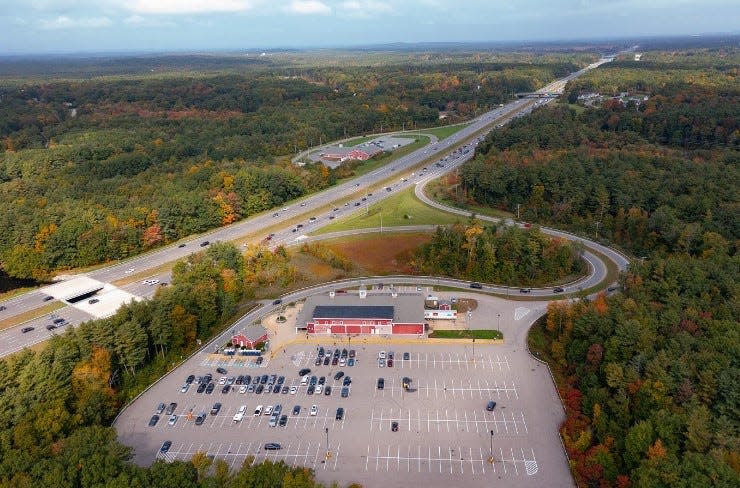I-95 NH liquor store development and more in Hampton move forward thanks to $300K deal
HAMPTON — The New Hampshire Liquor Commission has reached a deal with the town’s Conservation Commission, allowing it to move toward the sale and massive redevelopment of its properties along Hampton’s Interstate 95 corridor.
The deal the Conservation Commission approved July 31 includes a $300,000 donation to Hampton's conservation fund, which is used to purchase and protect town land from development.
The agreement allows the Liquor Commission to continue its pursuit to enlarge its liquor outlet stores and bring new commercial businesses to the roughly 39 million people who travel along I-95 annually, according to state Liquor Commission spokesperson E.J. Powers. It should also add significant revenues to state coffers and Hampton’s property tax rolls, Powers said.

Since 2021, Hampton officials have gone back and forth with the Liquor Commission over its plans to develop its unused land surrounding its liquor outlets, located with town borders along both the northbound and southbound sides of I-95. Along with more than doubling the size of the liquor stores to 22,000 square feet each, Powers said, the Liquor Commission hopes to sell to a developer its surplus property at the sites — 64 acres of land on the northbound side and 24 acres on the southbound side.
New vision for Liberty Lane in Hampton: New vision for Liberty Lane in Hampton: Affordable apartments, restaurant, and dog park
With the input of the town's Planning Board, in March 2022 Hampton voters approved a new overlay zoning district for the I-95 corridor, which is close to the Granite State’s border with Massachusetts. Now permitted are most of the commercial uses the Liquor Commission proposed. At the town’s insistence, however, the new zoning regulations exclude the development of hotels or casino gaming in the overlay district, uses the Liquor Commission originally requested.
The expectation is developers will bring businesses such as retail stores, restaurants, gas stations with electric charging stations, along with rest areas, information kiosks, and other visitor attractions.
“This is a very unique opportunity,” Powers said. “This is one of the only available properties with direct access to an interstate left in the nation. It’s definitely the only property like it left in the state of New Hampshire.”
Hampton Mounted Patrol Unit: Tucker recovering after lifesaving emergency surgery
What is the deal with the town’s Conservation Commission?
The agreement with Hampton was important because the Liquor Commission’s wetland permit on its land along I-95 in Hampton was received in 1993, when the agency originally built its two liquor outlets. Issued by the New Hampshire Department of Environmental Services, it required that whatever acreage not utilized by the Liquor Commission at the time “remain undeveloped and be placed in conservation,” according to the draft Hampton Conservation Commission minutes.
To redevelop its I-95 properties in Hampton effectively, however, the Liquor Commission filed an amendment to its 1993 permit with NHDES. It proposes the Liquor Commission take 11.21 acres of protected uplands along the northbound side out of conservation and put the same amount of acreage on the southbound side into conservation to remain protected, according to the draft minutes.
The July 31 agreement stipulates the Hampton Conservation Commission and the town won’t challenge the Liquor Commission’s amendment request to NHDES or appeal it if approved. Then, when the final easement is recorded, the Liquor Commission “will make a one-time payment to the town of Hampton Conservation Fund in the amount of $300,000,” according to the draft minutes of the commission's July 31 meeting.
Route 1 in Seabrook: Road widening project faces delays and rising costs
What’s next for I-95 Hampton development
Powers said in getting the Hampton I-95 project off the drafting board, the Liquor Commission has worked with several agencies.
“It’s been a long collaborative effort with the town of Hampton, the departments of Environmental Services, Administrative Services and the Justice Department,” Powers said. “With this agreement, we’re one step closer to being able to go out with (requests for proposals).”
The commission still has administrative steps it must complete before the bidding process can begin, Powers said, but he expects those issues can be cleared up soon, and the Liquor Commission can issue its request for proposals to prospective developers in the not-too-distant future.
The Liquor Commission already issued requests for qualifications, Powers said, receiving responses from a number of “high quality” developers expressing interests in purchasing and developing the sites.
Among the companies in the running to receive requests for proposals when they’re issued are, Rt. 95 Hampton Outlets/Anagnost Realty & Development and Granite State Hospitality, which operates Common Man Roadside and opened the Hooksett welcome centers, as well as Carlisle Capital Corporation, I95 Seacoast Partners, Nouria Energy Corporation, and Venture III Holdings in Maine.
Route 1 restaurants embrace patio life: How WHYM and others are banking on outdoor dining
So far, Powers said, all who responded to the request for qualifications are still expressing interest in bidding on the project.
The Liquor Commission is expected to receive millions of dollars from the sale, at least enough to expunge its total bonded debt, money it owns for building its statewide liquor outlets, according to Powers.
Currently, the two 10,000-square-foot liquor stores on I-95 in Hampton bring in about $55 million a year, Powers said, adding those dollars are used to help run the state. The hope is when the stores more than double in size, their income will rise significantly.
As for Hampton, Powers said, currently, property owned by the Liquor Commission — a state agency — cannot be taxed by the town. However, when the Liquor Commission sells the land not used for its stores to a commercial developer, that property will be taxable. Powers estimated it could generate about $1 million a year for Hampton’s tax base.
This article originally appeared on Portsmouth Herald: Hampton, NH Liquor Commission reach I-95 development deal

